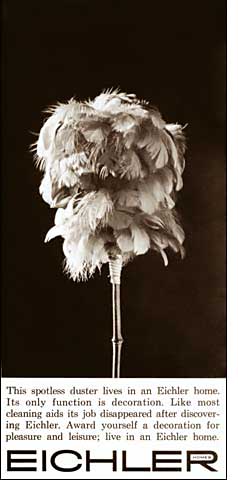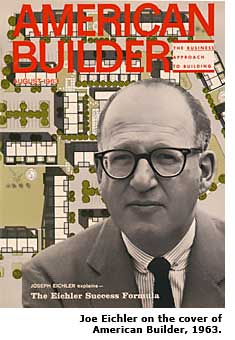Eichler vs. Eichler - Page 2
"It was my father's will and obstinacy that allowed him to construct these homes," Ned said. The contractors and workers loved Joe. "They would respond because he was so absolutely dedicated to making this work," Ned added. "Everybody who worked there picked this up, or they didn't work there."

It bothers Ned that people think his father was nothing more than a sponsor of modern architecture. "It is true—but it's the nature of that sponsorship and his character that made it happen," Ned said. "Much as I fought with my father on this count, I have enormous admiration for him."
"He had enormous integrity. At meetings, the salesmen would want to change things. Even the architects said we could change things in the houses to sell them. My father would say, 'We're not going to change it.' He was willing to put himself on the line, his money and his principles."
"My father was a very natural man. He was who he was and he never changed that," Ned said, recalling how he would cringe when his father would call a waiter at Jack's restaurant in San Francisco. "He'd say, 'Hey Chief, I'd like to have my coffee.' I'd want to crawl under the tables. I was very easily embarrassed as a kid. He was incapable of being embarrassed."
And, Ned said, he and his dad often got along fine. "I had a pretty good relationship with him when I wasn't in the business. We'd meet fairly often and talk about things, Democratic politics."
Ned started working in the business during summers as a college student, "installing lawns, driving a truck, carrying lumber, and as a laborer for a framing crew," Ned wrote in his book, 'The Merchant Builders.'
In 1951 and 1952, Ned ran the purchasing operation for Eichler Homes for a year after college at Dartmouth, where he majored in economics to please his father. Joe built the first architect-designed Eichler homes in 1950, while Ned was in college. Ned proudly showed photos of the glass-walled homes to his art history professor.
The firm was a family operation, with Ned and his brother Dick both owning stock. Joe's brother Al worked as salesman. Ned's maternal uncle and aunt also worked for the company. In purchasing, Ned set up the system Eichler would follow for the rest of his career: buying supplies in bulks, and packaging and cutting it to order at a company-owned yard for delivery to each building site.
After a year with Eichler Homes, Ned was drafted into the Army in 1952. It was during his final year, in Europe, that he considered life in a Parisian garret. "But there was this constant pull," Ned said, including a letter from his father asking him to rejoin the company. About working for the company, Ned said, "All of this, looking back at it, was trying to get his attention."
Joe appointed Ned sales manager in 1954. "I didn't know marketing," Ned said of his new job, "but he said it. So I did it."
Ned proved adept at marketing. He supervised the sales force, oversaw the work of photographer Ernie Braun, and even suggested that Eichler build the all-steel X-100 house in San Mateo as a promotional ploy.
But when Ned put some of his theories into practice, he was slapped down. In an effort to appeal to buyers who appreciated modern homes because they are easy to clean, Ned devised a newspaper ad campaign that showed a feather duster on a black background. It won awards and sold houses. But Joe protested. "He said, '[the ads] don't show my houses.' I tried to explain. We had a terrific fight about it, and he simply ordered me to stop it."

"This was a guy I really wanted to satisfy that I was a good person, that I was a worthwhile human being. Or that I existed, in a sense. And this was for me a tremendous attack on me, not just on an idea. But I got over it."
Ned opposed many of his father's ventures that departed from their successful formula of building suburban tract homes in the Bay Area, arguing that building semi-custom homes required more work than it was worth, and that building apartments and townhouses in San Francisco "was nothing we knew how to do."
"I said, this is going to be a disaster, and it's going to divert our attention from problems we were having with the regular business."
Ned's warnings proved prescient. Eichler Homes' move into San Francisco residential high-rises helped lead to the company's bankruptcy in 1966.
Ned also spoke against expanding their tract business to Southern California, arguing that the venture would be difficult to run from 500 miles away. When Joe insisted, Ned changed his tack. "One person has to be in charge of it," he told Joe, and had to move to Southern California. "Again, I wanted him to recognize that I was that person."




